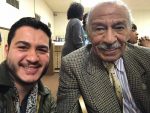A Better Response to Bennett’s “Terror State” Claim
Whether the two-state solution is dead or merely in a coma remains an open question. But if serious negotiations ever do return, if they are to succeed, they will have to grapple with the real possibility that in an independent Palestinian state, Hamas could come to power by democratic means. It is both morally and strategically untenable that a peace agreement rests upon postponing Palestinian democracy indefinitely.
By Jerome M. Segal

At their joint press conference at the close of German Chancellor Merkel’s recent visit to Israel, Prime Minister Bennett pushed back on Ms. Merkel’s support for the two-state solution to the conflict. Bennett said, “A Palestinian state would mean a terror state” and that it would “be established roughly seven minutes from my house and almost any point in Israel.”
The Palestinian response was quick, with a PLO spokesman saying “The worst form of terrorism is the occupation, not the establishment of a Palestinian state.” But more than this is needed.
While Bennett’s comments about a terror state are, in good part, rationalization for his ideological determination to extend Israeli sovereignty to the West Bank, for most Israelis the terror state concern is genuine.
Whether the two-state solution is dead or merely in a coma remains an open question. But if serious negotiations ever do return, if they are to succeed, they will have to grapple with the real possibility that in an independent Palestinian state, Hamas could come to power by democratic means. It is both morally and strategically untenable that a peace agreement rests upon postponing Palestinian democracy indefinitely.
Future Israel-PLO negotiations, if they are serious, will have to provide the Israeli public with a basis for believing that a potential Hamas government would view itself as bound by the terms of an agreement it opposes. While PLO negotiators may not worry about such eventualities, Israelis will, and unless there is a solution, it is not likely an agreement will be reached in the first place.

Is there anything that would make it more likely that an elected, but ideologically unchanged, Hamas government would abide by the terms of a PLO-negotiated treaty that proclaimed the end of the conflict?
In considering this we must go back to 2006 and the Hamas victory in the elections for the Palestinian Parliament. This was a period in which the Hamas-Fatah competition was increasingly intense, with armed clashes a regular occurrence. In May 2006, six weeks after Hamas won the Parliamentary elections of the Palestinian Authority, a document was signed by leaders of five Palestinian factions (Fatah, Hamas, Islamic Jihad, PFLP and DFLP) who were being held in Israeli prisons. Referred to as “The Prisoners’ Document,” this National Conciliation Document sought to achieve Palestinian unity, affirming core principles, affirming the centrality of the PLO and proposing reforms of the PLO that would bring into the PLO, factions that were outside its broad umbrella (e.g. Hamas).
Most interestingly in paragraph 7, the Document affirmed the authority of “the PLO and the President of the PNA” to conduct negotiations with Israel, but specified that “any final agreement must be presented to the new PNC for ratification or to hold a general referendum wherever it is possible.” The PNC (Palestine National Council) is the PLO parliament and the ultimate authority for the organization.
Subsequently, a month later, Hamas and Fatah agreed on a slightly revised document, with almost no change to this paragraph. The revised version read, “Any agreement must be presented to the new PNC for ratification or a general referendum to be held in the homeland and the Diaspora . . . .” The new specification, “and the Diaspora” emphasized the importance of approval by the refugees, worldwide.
Hamas’s agreement to a process of ratification of a treaty negotiated by the PLO came in the context of the imposition on the newly elected Hamas government of Quartet (US, UN, EU and Russia) conditions for foreign assistance. The three conditions, framed as “principles,” were 1) non-violence 2) recognition of Israel, and 3) acceptance of previous agreements [made by the PLO] and their obligations. The conditions were not well thought out, and while Hamas was eager to be given a chance to rule, there was no likelihood that they would meet them. However, in accepting the Prisoners’ Document, Hamas, rather than dealing with past agreements, took a future-oriented stance when it committed to acceptance of a PLO-negotiated peace agreement if it were approved in a referendum. This, rather than the three Quartet conditions, is what a viable peace process really needed from Hamas. It was one of the greatest policy errors of the Quartet, and primarily of the U.S., that the significance of the Fatah-Hamas agreement was not appreciated.
Subsequently Hamas leaders have re-affirmed the ratification-by-referendum framework as one that would be binding on the organization. In early 2007, Fatah and Hamas formed a short-lived unity government and one of the elements of their government platform was a re-affirmation that negotiations would be carried out by PLO Chairman Abbas, but that any agreement had to be submitted to a referendum. Indeed, the platform went further and affirmed that a law would be adopted laying out the procedures for such a referendum. This too was largely ignored.
Nonetheless, Hamas did not abandon its commitment to abide by a referendum on a PLO negotiated agreement. Thus, in 2010, Ismail Haniyeh, who in 2006 became Prime Minister of the Palestinian Authority, at a press conference stated, “Hamas will accept the results (of a referendum) regardless of whether it differs with its ideology and principles” provided that it included all Palestinians in the West Bank, Gaza and the diaspora. [i]
And in March 2014, The Times of Israel, in an article entitled “Hamas Would Accept Peace With Israel, West Bank Leader Says” [ii] reported that Sheik Hassan Yousef stated, “It is our right to oppose an agreement that [PA President] Mahmoud Abbas brings, like you have your own opposition, but I stress here: We will accept the results of a national referendum and the decision of the majority.”
Neither Israel nor the U.S. ever made any effort to strengthen the Hamas commitment. It was completely ignored, perhaps even below the level of their awareness. Former Assistant Secretary of State, Elliott Abrams, in “Tested by Zion,” his detailed book about the workings of the Bush Administration in that period, doesn’t even mention the ratification by referendum agreement reach by Fatah and Hamas.
Yet even today, it is not too late to build on Hamas’ commitment to abide by a referendum. Three objectives should be pursued. First to bring this commitment into the present. Second, to place it on a stronger footing than merely a Fatah-Hamas agreement. Rather, abiding by a referendum should be seen as necessitated by respect for the right of the Palestinian people to self-determination. And third, to achieve an international consensus that fidelity to this commitment to abide by a ratified end of conflict agreement is the core demand on Hamas, not its recognition of Israel, nor a transformed ideology.
These goals can be fruitfully advanced through action by the United Nations. If there is U.S. support, it can be taken up by the Security Council. Alternatively, with or without U.S. support, through the General Assembly. If the latter, Iran would likely vote for it, with some positive effect from its commitment to not aid efforts to undo a referendum-endorsed peace between Israel and the Palestinians
Here is what the Security Council might affirm:
UN Resolution on Palestinian Referendum
The Security Council,
- Deeply concerned to advance movement towards a just resolution of the Israeli-Palestinian conflict;
- Affirming the right of the Palestinian people to self-determination;
- Aware of the provisions of the Palestinian Prisoners Document of 2006 which identified a referendum of the Palestinian people as a vehicle for conferring ratification upon any peace agreement negotiated between the Government of Israel and the PL0;
- Further aware that in subsequent negotiations between Fatah and Hamas, similar agreement was reached that a peace agreement approved in a referendum of the Palestinian people including the Diaspora would thereby receive necessary ratification;
- Resolves that any peace agreement between Israel and the Palestinians that is affirmed by a referendum of the Palestinian people is to be deemed an expression of the self-determination of the Palestinian people;
- Further resolves that any such ratified peace agreement must thus be respected by all nations and non-state actors.
So worded, the resolution does not call on any party to take any immediate steps. It is an international statement of principle that establishes, for state and non-state actors, a norm to govern behavior in the event that the Palestinian people affirmed a peace agreement.
The passage of such a resolution, in itself, will not erase Israeli fears about what might happen if there is a Hamas-led Palestinian state, but it is a fundamental starting point for addressing the misconception that Hamas cannot be bound by a peace agreement Israel negotiates with the PLO. Moreover, it is very low hanging fruit; such a resolution would not face any serious opposition at the UN, and conceivably could win unanimous support of the world body. As follow up, the Quartet should revisit its conditions for assistance to a Palestinian unity government. The broader thrust of policy should be to promote movement of the two largest Palestinian factions, Fatah and Hamas, into a coherent framework of governance, one that lays the foundation for a time at which Hamas will be allowed to function as a political party, to compete for power democratically, and to actually govern if it is successful, but to govern within the constraints of an end of conflict agreement with Israel legitimized through the referendum process.
(Jerome M. Segal is the Director of The Peace Consultancy. This article is adapted from his forthcoming book, “The Olive Branch From Palestine: The Palestinian Declaration of Independence and the Path Out of the Current Impasse,” Univ. of California Press. email him at Jerome@jeromesegal.org.)
(This Op-Ed first appeared in al-Quds (Jerusalem) in Arabic Oct. 29, 2021. It is reprinted by permission of the author.)
FootNotes
[i] Reuters, “Hamas Would honor referendum on peace with Israel,” December 1, 2010.
[ii] Reported by Avi Issacharoff, Times of Israel, March 25, 2014.


- The RSF mutiny’s resonance in Sudan: Understanding some of its impacts on regional and global dynamics - September 23, 2023
- Factors Stalling the Peace Process in Sudan - August 28, 2023
- Reviving the Bread-basket Strategy: The Backbone of Sudan’s Recovery - August 10, 2023

























